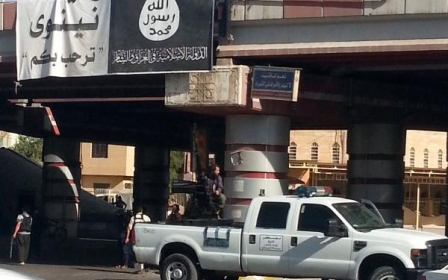Iraqi militias launch Mosul attack to cut IS off from Syria
Iraqi paramilitary groups began an offensive on Saturday against Islamic State (IS) positions west of Mosul to cut their supply lines to Syria, opening a new front in the nearly two-week-old offensive.
"The operation aims to cut supplies between Mosul and Raqqa and tighten the siege of (IS) in Mosul and liberate Tal Afar," al-Hashd al-Shaabi spokesperson Ahmed al-Assadi told AFP, referring to IS's main strongholds in Iraq and Syria.
Forces from al-Hashd al-Shaabi, a paramilitary umbrella organisation dominated by Iran-backed Shia militias, have largely been on the sidelines since the operation to retake Mosul from IS was launched last week.
Assadi also said his forces are "fully ready" to deploy outside Iraq if needed.
"After clearing all our land from these terrorist gangs, we are fully ready to go to any place that contains a threat to Iraqi national security," he told a news conference in Baghdad on Saturday.
The militia spokesman said the operation aims to retake the towns of Hatra and Tal Abta as well as Tal Afar, an area held by IS since 2014.
Though Shia-majority, Tal Afar is close to Turkey and is home to a sizeable ethnic Turkmen population, meaning the militia's latest offensive could cause concern in Ankara.
The operation could also bring the fighting perilously close to the ancient city of Hatra, located northeast of the town of the same name, a UNESCO world heritage site that has already been vandalised by IS.
Though it was not mentioned by name, the operation may also pass near the ruins of Nimrud, another archaeological site that has previously been attacked by IS.
Controversy
The involvement of Shia militias in the Mosul operation has been a source of contention, although some of al-Hashd al-Shaabi's top commanders insist they do not plan to enter the largely Sunni city.
Earlier announcements by the group of its intention to advance towards Mosul have drawn warnings from human rights groups concerned about sectarian violence in the mainly Sunni province. Shias make up a majority in Iraq but Sunnis are predominant in the north and the west.
Iraqi Kurds and Sunni Arab politicians have opposed their involvement, as has Turkey, which has a military presence east of Mosul despite repeated demands by Baghdad for the forces to be withdrawn. Relations between al-Hashd al-Shaabi and the US-led coalition fighting IS are also tense.
Amnesty International says that in previous campaigns, the militias have committed "serious human rights violations, including war crimes" against civilians fleeing IS-held territory.
The UN in July said it had a list of more than 640 Sunni Muslim men and boys reportedly abducted by a Shia militia in Falluja, a former militant stronghold west of Baghdad, and a list of about 50 others who were summarily executed or tortured to death.
The Iraqi government says a limited number of violations have occurred and that they were investigated, but denies that abuses have been widespread and systematic.
IS overran large areas north and west of Baghdad in 2014, but Iraqi forces have since regained significant ground.
Mosul is now the last major city in the country held by the militants.
The battle for Mosul is expected to be the biggest in the 13 years of turmoil unleashed in Iraq by the 2003 US-led invasion that toppled former president Saddam Hussein and brought to power a government dominated by Iraq's Shia Muslim majority.
The loss of Mosul would mark IS's effective defeat in Iraq, two years after their leader Abu Bakr al-Baghdadi declared a 'caliphate' overlapping Iraq and Syria from the pulpit of a Mosul mosque - but it could also inflame sectarian tension in the mainly Sunni region.
Iraqi soldiers and security forces and Kurdish peshmerga fighters have been advancing over the past 12 days on the southern, eastern and northeastern fronts around the city, which remains home to 1.5 million people.
The United Nations has warned of a humanitarian crisis and the potential of a huge refugee exodus from Mosul - though the start of operations on the city's western flank could leave Mosul's civilians with no outlet to safety, even if they are able to escape IS control.
More than 17,500 people have fled their homes toward government-held areas since the Mosul operation began, the International Organisation for Migration said on Saturday. Numbers are expected to soar as Iraqi forces close in.
Villagers from outlying areas around Mosul have told Reuters that women and children were being forced to walk as human shields alongside retreating IS fighters as they withdrew into the city this week.
Iraqi and Western military sources say there had been debate about whether or not to seal off Mosul's western flank. Leaving it open would have offered IS a chance to retreat, potentially sparing residents from a devastating, inner-city fight to the finish.
IS militants have also launched a series of diversionary attacks since the Mosul operation began, including one in the city of Kirkuk that sparked multiple days of fighting and left dozens dead.
Officials said on Saturday that another such diversion, this time in the Ramadi area, west of Baghdad, had been foiled and 11 people arrested.
Stay informed with MEE's newsletters
Sign up to get the latest alerts, insights and analysis, starting with Turkey Unpacked
Middle East Eye delivers independent and unrivalled coverage and analysis of the Middle East, North Africa and beyond. To learn more about republishing this content and the associated fees, please fill out this form. More about MEE can be found here.




